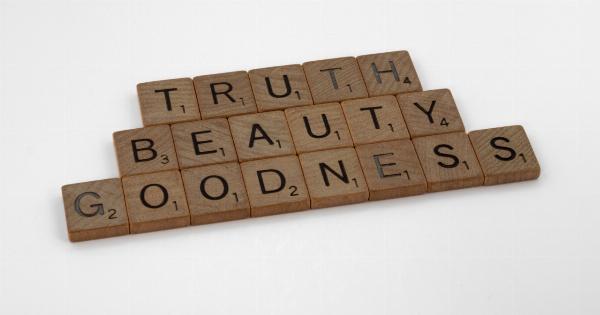Beauty is a topic that carries a lot of weight in our society. The way we perceive beauty has a significant impact on our self-esteem, confidence, and overall well-being.
However, when it comes to discussing beauty openly and honestly, it is often treated as a taboo topic. This silence around beauty can be detrimental to individuals, as it exposes them to unrealistic beauty standards and restricts their ability to have genuine conversations about their concerns and experiences.
In this article, we will explore why beauty is considered a taboo topic and the potential consequences of this silence.
The Historical Context of Beauty Taboo
In order to understand why beauty is such a taboo topic, it is essential to examine its historical context. Throughout history, beauty has always been highly valued, but the definition of beauty has changed drastically over time.
In ancient cultures, beauty was often associated with physical perfection, while in some societies, beauty standards emphasized qualities such as inner wisdom, strength, and character.
However, with the rise of mass media and globalization, there has been a significant shift in beauty standards.
Western beauty ideals, characterized by slim bodies, clear skin, and certain facial features, have become the dominant norm in many parts of the world. This narrow definition of beauty perpetuates unrealistic expectations and creates a culture where people feel pressured to conform to these standards to be considered attractive.
With such rigid beauty expectations, the topic of beauty has become fraught with societal judgment and scrutiny.
People often fear discussing beauty openly because they worry about being judged or ridiculed for not fitting into the mold of what is considered beautiful. This fear is not unwarranted, as countless individuals have been bullied, body-shamed, or stigmatized for not meeting society’s unrealistic beauty standards.
The Emotional Impact of Beauty Silence
The taboo surrounding beauty has severe emotional consequences. When individuals are unable to openly discuss their insecurities, concerns, or experiences related to beauty, they may feel isolated and inadequate.
This silence can contribute to feelings of low self-esteem, body dysmorphia, and even depression.
Furthermore, the lack of dialogue around beauty creates an environment where people’s struggles are invalidated or dismissed.
Instead of finding support and understanding, individuals dealing with beauty-related issues may find themselves brushing off their concerns or suppressing their emotions. This can exacerbate the negative impact on their mental health and well-being.
Moreover, the taboo around beauty limits our ability to have real conversations about the unrealistic beauty standards perpetuated by the media.
By not openly addressing these issues, we continue to fuel a culture that places appearance above all else, with detrimental effects on individuals’ mental health and self-worth.
Breaking the Taboo: The Importance of Open Dialogue
In order to challenge the beauty taboo, it is crucial to foster open dialogue around beauty.
By creating safe spaces for individuals to express their thoughts, concerns, and experiences related to beauty, we can begin to break down the barriers that silence creates.
Open dialogue allows individuals to share their insecurities and challenges without fear of judgment. It helps create a sense of community, where people can support one another and gain valuable insights and perspectives.
Through these conversations, individuals can challenge societal beauty standards and work towards redefining beauty in a more inclusive and realistic way.
Furthermore, open dialogue about beauty enables us to acknowledge the diversity of beauty. Beauty is not a one-size-fits-all concept, and by having honest conversations, we can celebrate the uniqueness and individuality of people’s appearances.
This can have a profound impact on individuals’ self-acceptance and overall well-being.
The Role of Education and Media
To break the beauty taboo, education and media play a vital role. Schools and educational institutions should prioritize teaching young people about the unrealistic nature of beauty standards and encourage critical thinking around media messages.
By empowering individuals with knowledge and awareness, we can equip them to challenge societal norms and engage in open discussions about beauty.
Similarly, the media has a responsibility to promote diversity and inclusivity in their representations of beauty.
By showcasing individuals of all shapes, sizes, and backgrounds, the media can help break down the narrow beauty standards and create a more realistic portrayal of beauty. Additionally, media platforms can give voice to diverse perspectives on beauty, further encouraging open dialogue and shifting societal beauty ideals.
Embracing Authenticity: Redefining Beauty
The true essence of beauty lies beyond physical appearance. It is about embracing authenticity and celebrating individuality.
Breaking the beauty taboo means redefining beauty to include kindness, compassion, strength, intelligence, and other qualities that go beyond superficial attributes.
By shifting our focus from external beauty to inner qualities, we can foster a more inclusive and accepting society.
It is crucial to recognize that beauty is not a measure of worth or happiness, and everyone deserves to feel comfortable and confident in their own skin, regardless of how closely they align with societal beauty standards.
It is time to challenge the silence around beauty and create a society where open conversations about beauty are encouraged and celebrated.
By doing so, we can empower individuals to embrace their uniqueness and redefine beauty in a way that truly reflects the diversity and complexity of the human experience.































